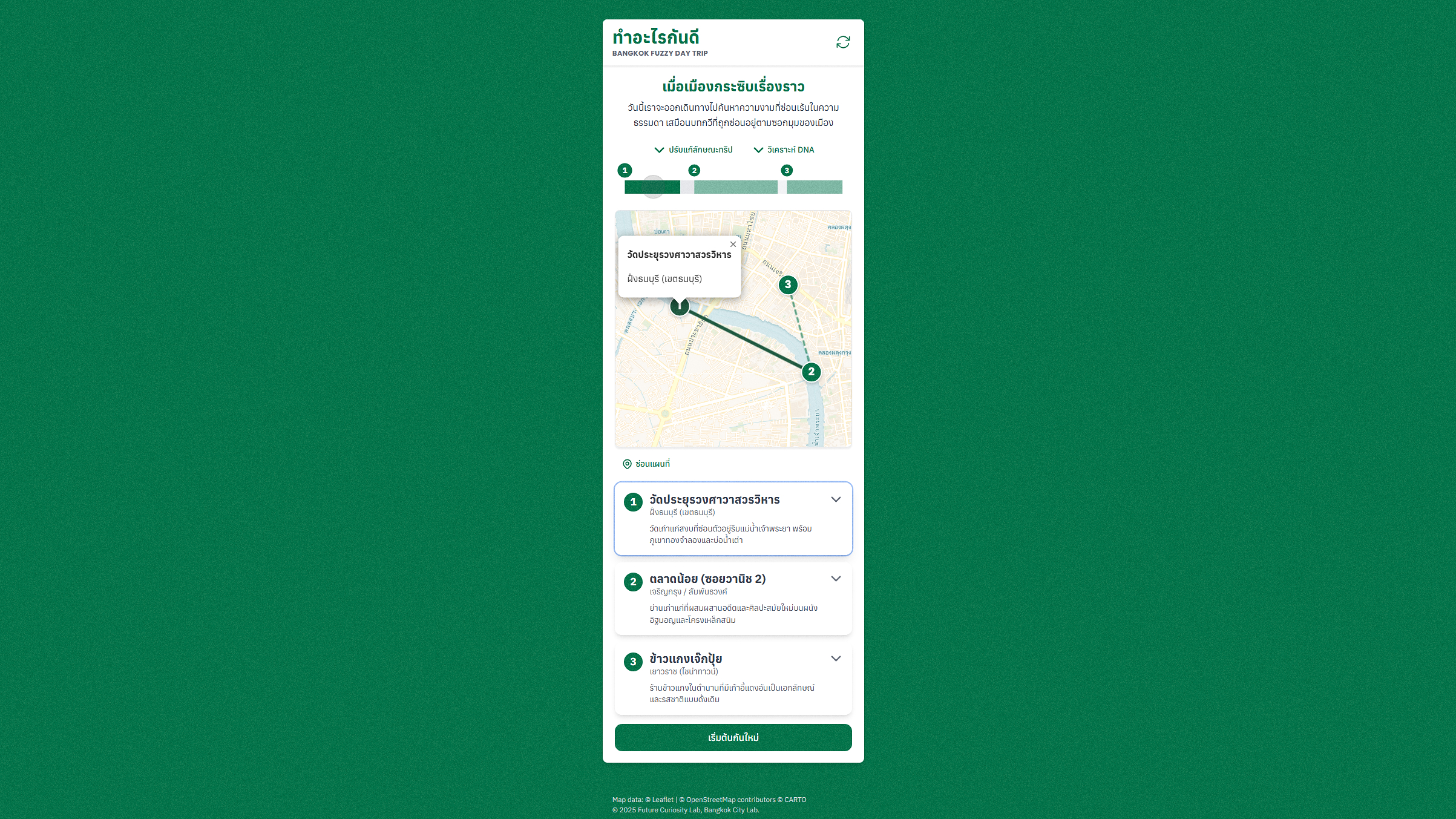
Image courtesy of Bangkok City Lab
แนวคิดโครงการ
Bangkok Fuzzy Day Trip เป็นโครงการทดลองต้นแบบ (prototype) ภายใต้โครงการ “Development of Research Tools for Urban Data Collection” ของ ศูนย์การทดลองเมืองกรุงเทพมหานคร (Bangkok City Lab) ที่สำรวจแนวคิด Playful Urban Engagement เพื่อพัฒนาเครื่องมือที่ช่วยให้ผู้อยู่อาศัยได้เชื่อมโยงกับเมืองในรูปแบบที่สนุกและเป็นกันเอง
ระบบนี้ทำงานเหมือน “ผู้ช่วยสำรวจเมือง” โดยใช้เทคโนโลยีปัญญาประดิษฐ์ (AI) ที่ผ่านการฝึกเฉพาะทาง เพื่อสร้างเส้นทางเดินเที่ยวแบบไม่ตายตัว—สะท้อนทั้งความไม่แน่นอน (fuzzy) และความสอดคล้องกับอารมณ์หรือความสนใจของผู้ใช้
หัวใจของโครงการอยู่ที่แนวคิด fuzzy logic ซึ่งยอมรับในความต่อเนื่องและความคลุมเครือ ไม่ใช่แค่ในเชิงกายภาพของเมือง แต่รวมถึงทัศนคติ ค่านิยม และวิถีชีวิตของผู้คนในกรุงเทพมหานคร เมืองที่มีความผสมปนเปของพื้นที่ วัฒนธรรม และวิถีชีวิตที่หลากหลาย ทั้งเป็นทางการและไม่เป็นทางการ ทั้งสิ่งที่วางแผนไว้และสิ่งที่เกิดขึ้นโดยบังเอิญ หลายครั้งอาจไม่เป็นไปตามที่หวัง แต่กลับมอบสิ่งที่เกินคาด—pleasantly surprising accidents—ซึ่งกลายเป็นบุคลิกของเมือง
แรงบันดาลใจของ Bangkok Fuzzy Day Trip มาจากความรู้ในท้องถิ่น (insights) และเรื่องเล่าในชุมชน รวมถึงเสน่ห์ของเกร็ดเล็กเกร็ดน้อยในชีวิตประจำวัน โดยใช้เทคโนโลยีช่วยเปิดเผยมุมมองเหล่านี้ เพื่อให้ผู้คนสัมผัสตัวตนแท้จริงของเมือง ผ่านสิ่งเล็ก ๆ ที่มักถูกมองข้าม เช่น ร่องรอยของอาคารเก่า ลวดลายบนประตู หรือร้านเล็ก ๆ ในตรอกที่ไม่ปรากฏในคู่มือท่องเที่ยวกระแสหลัก
เป้าหมายคือการทดลองวิธีใหม่ในการเก็บข้อมูลเมือง และสร้างบริการที่เชื่อมโยงกับผู้คนและบริบทท้องถิ่น ผ่านประสบการณ์ที่สนุก ลึกซึ้ง และมีเอกลักษณ์แบบคลุมเครือของตนเอง
About Project: Playful Engagement and the Fuzzy City
The Bangkok Fuzzy Day Trip is an experimental prototype developed as part of Bangkok City Lab’s initiative, "Development of Research Tools for Urban Data Collection." This project builds upon the concept of Playful Urban Engagement, exploring how interactive experiences can create meaningful connections between residents and their city.
Acting as an "urban exploration assistant," the prototype generates personalized day-trip itineraries. Unlike typical travel planners, it employs a custom-trained AI designed to produce creative and intentionally "fuzzy"—serendipitous and unpredictable—recommendations, closely matching users' moods and interests. The tool aims to test new methods of urban data collection while envisioning innovative city-centric services.
Context: Inspiration from Local Wisdom and Guidebooks
This project is inspired by the insightful storytelling found in both guidebooks and local community knowledge. Every great city possesses a kind of unwritten manual—an informal collection of stories, architectural details, and local traditions passed down among residents.
Our project asks: how can technology celebrate and share this local wisdom? We aim to create a tool that feels like exploring with a knowledgeable friend—someone who notices the charm of peeling paint on an old shophouse or knows the story behind a quiet alley. We believe the identity of a city is co-authored through the everyday experiences of its people.
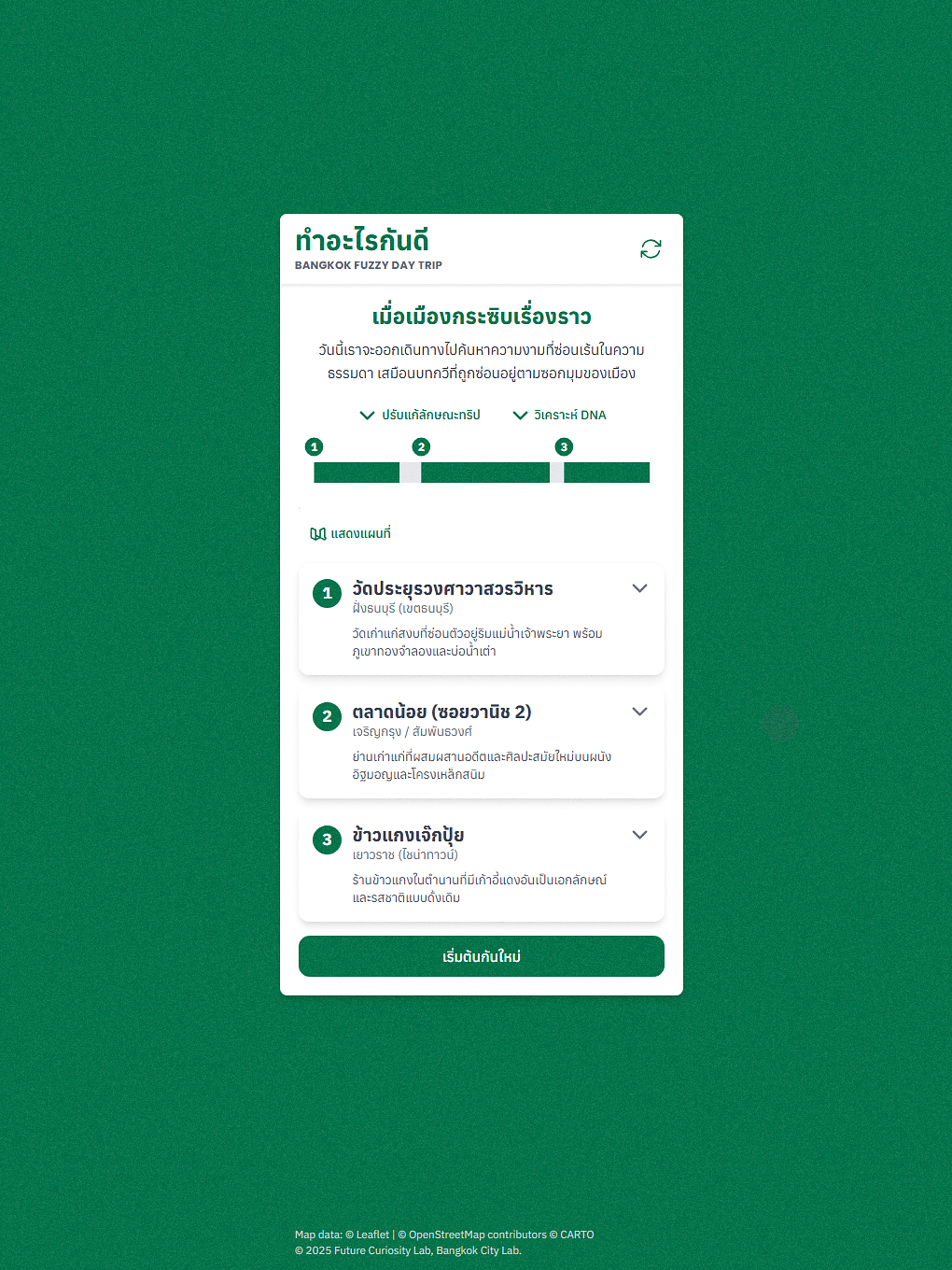
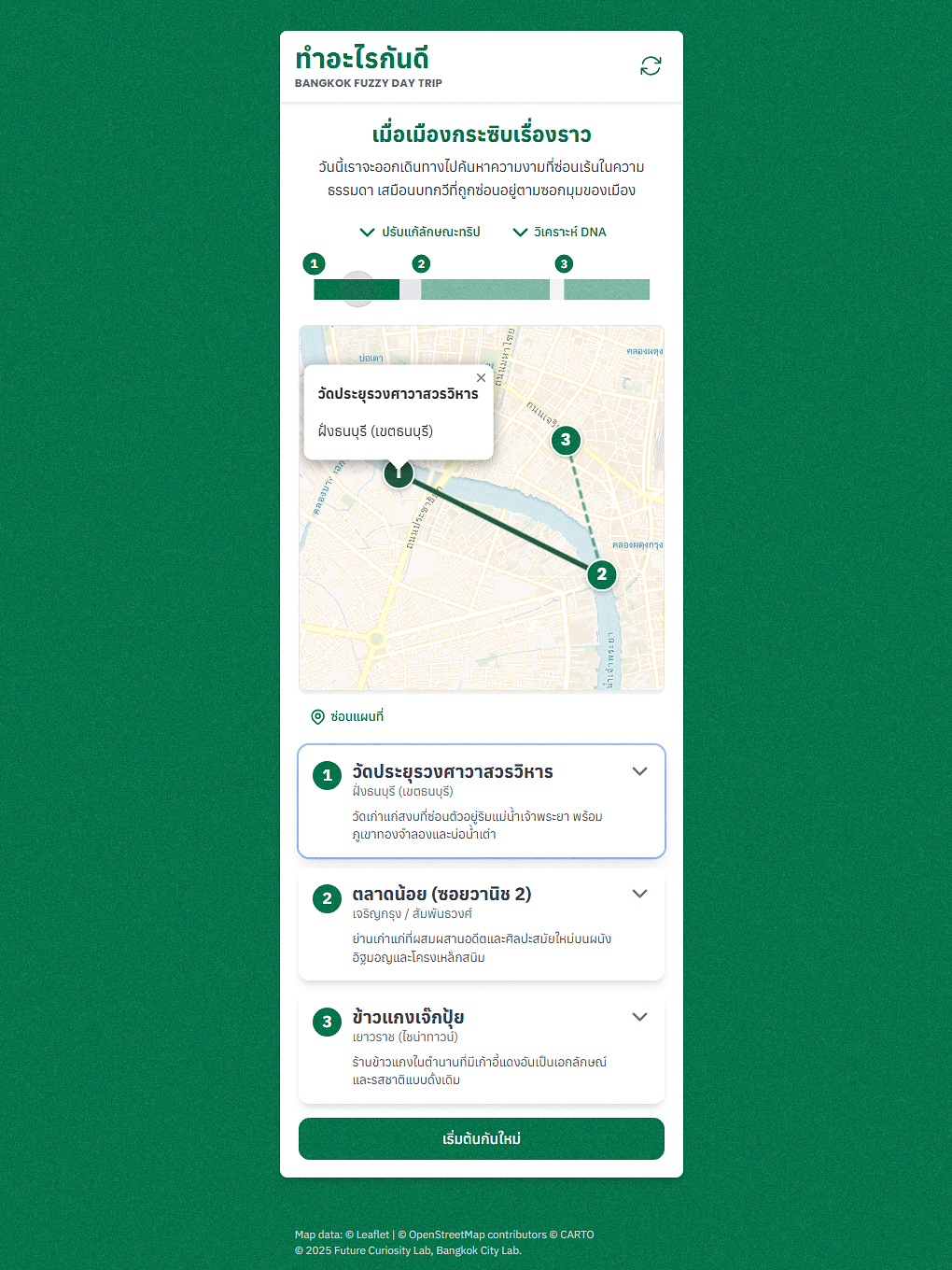
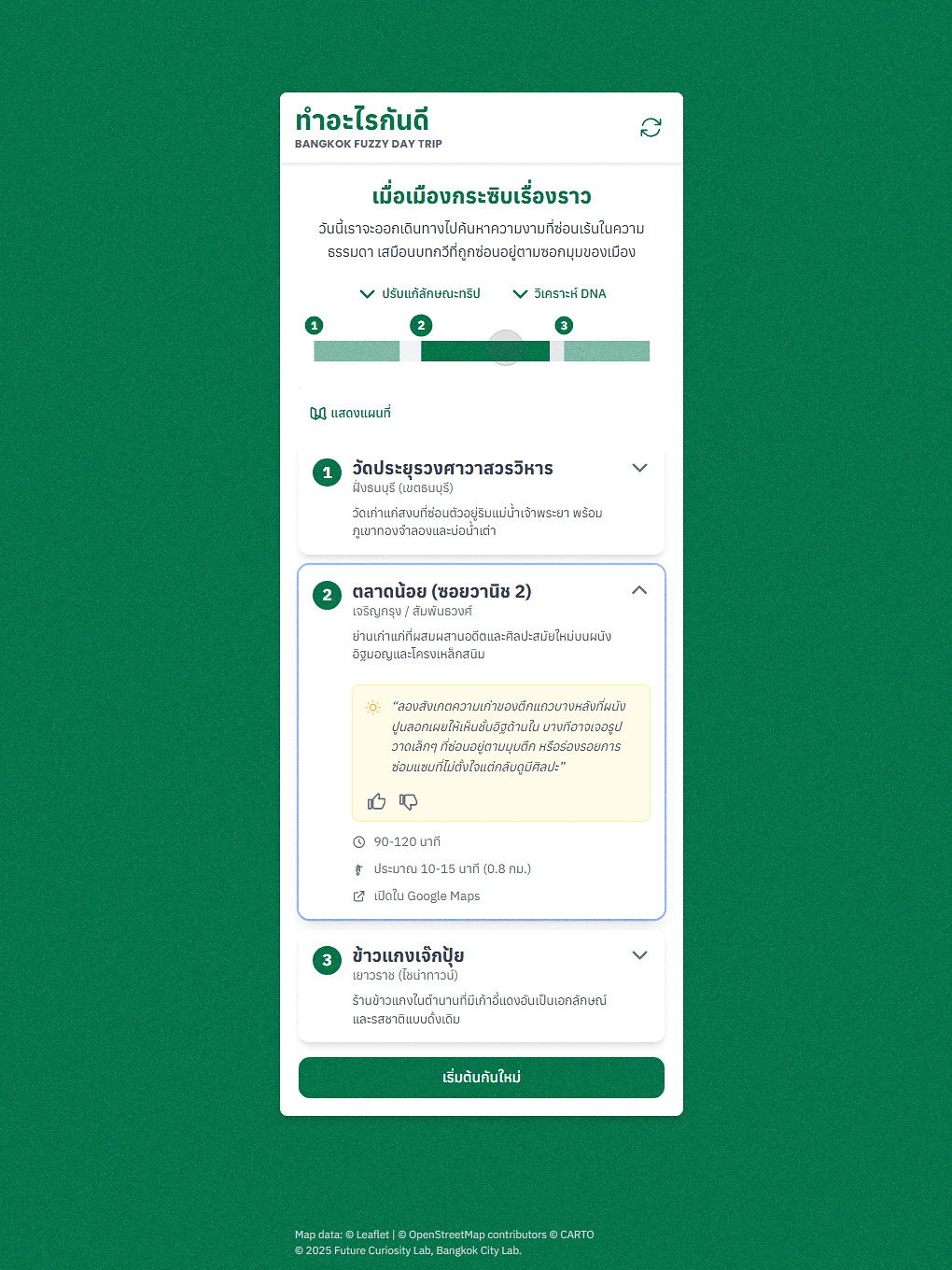
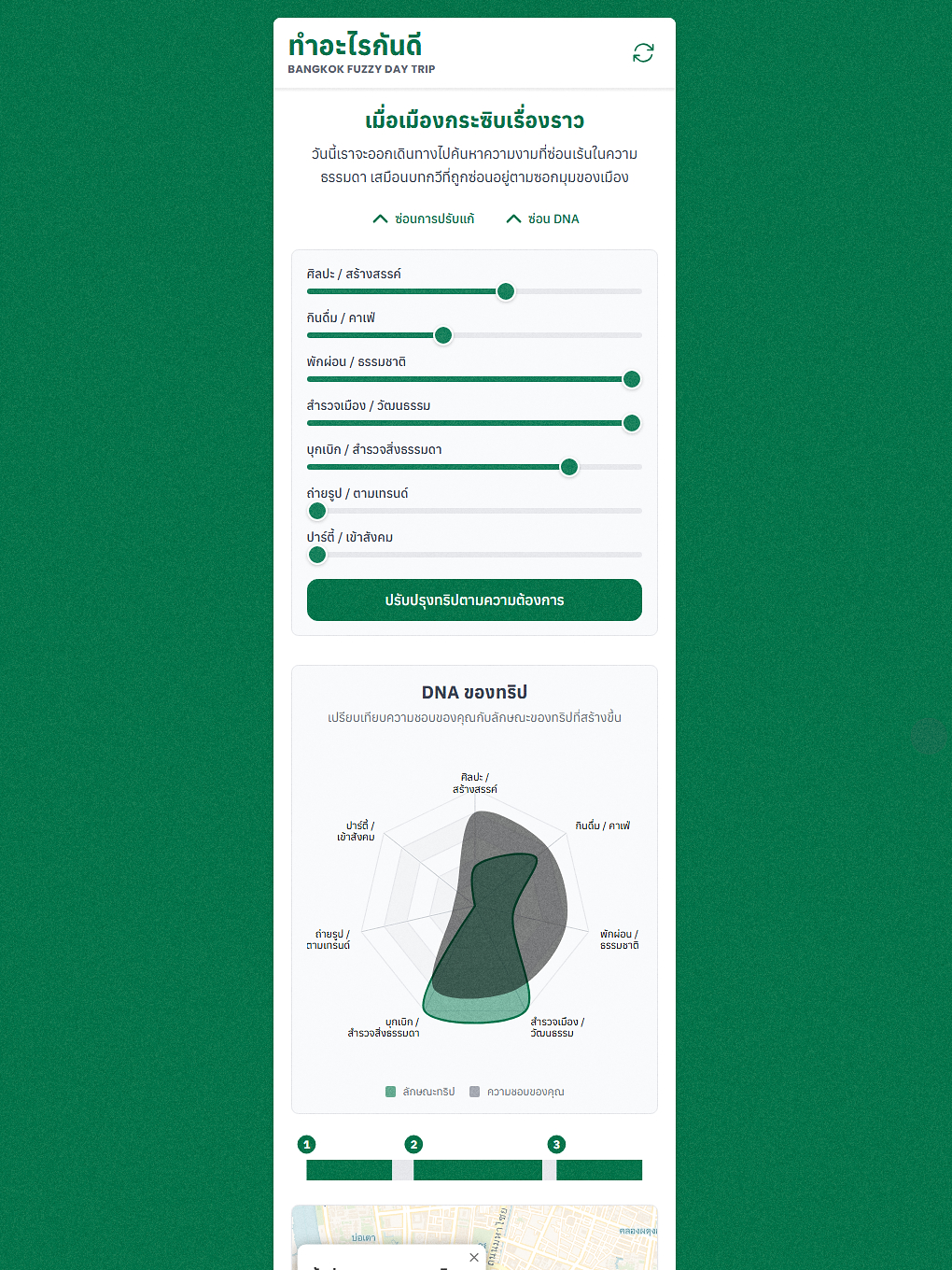
Methodology: An AI with a Point of View
The core of Bangkok Fuzzy Day Trip is its curated AI Agent. Our methodology focuses on establishing an AI with a distinct personality, shaped by two key strategies:
Curated Knowledge Base: The AI was trained using a specialized dataset from the Future Curiosity Lab. This dataset emphasizes authenticity over popularity, spotlighting overlooked locations, non-commercial activities, and the quiet pleasures of urban discovery. This gives the AI an observant and slightly unconventional "voice."
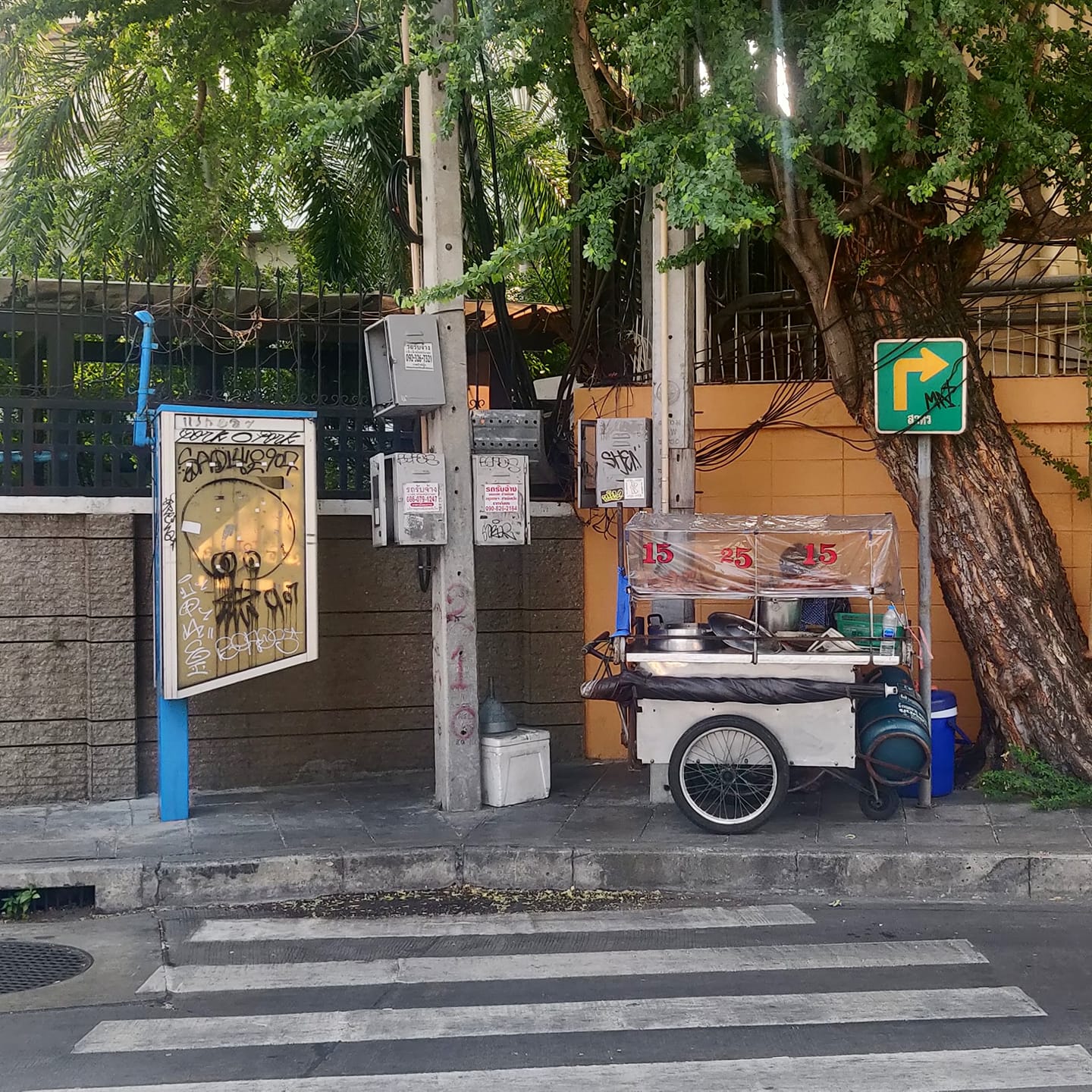
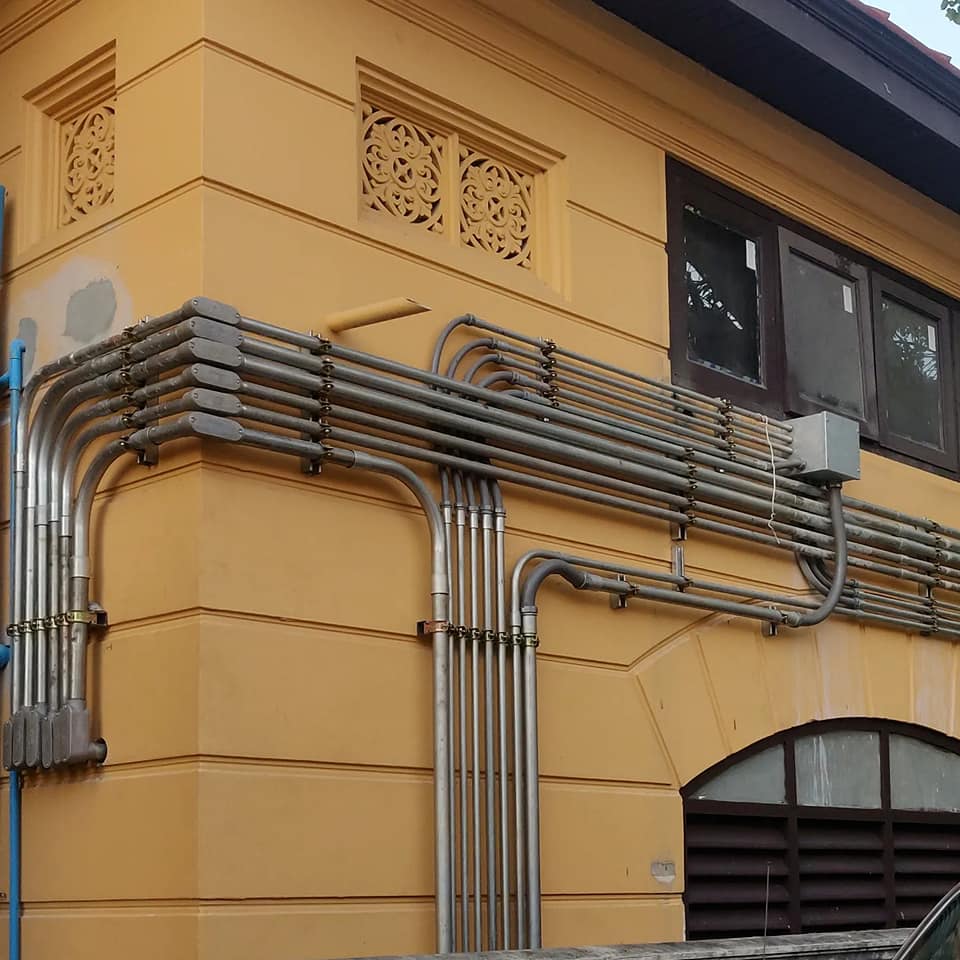
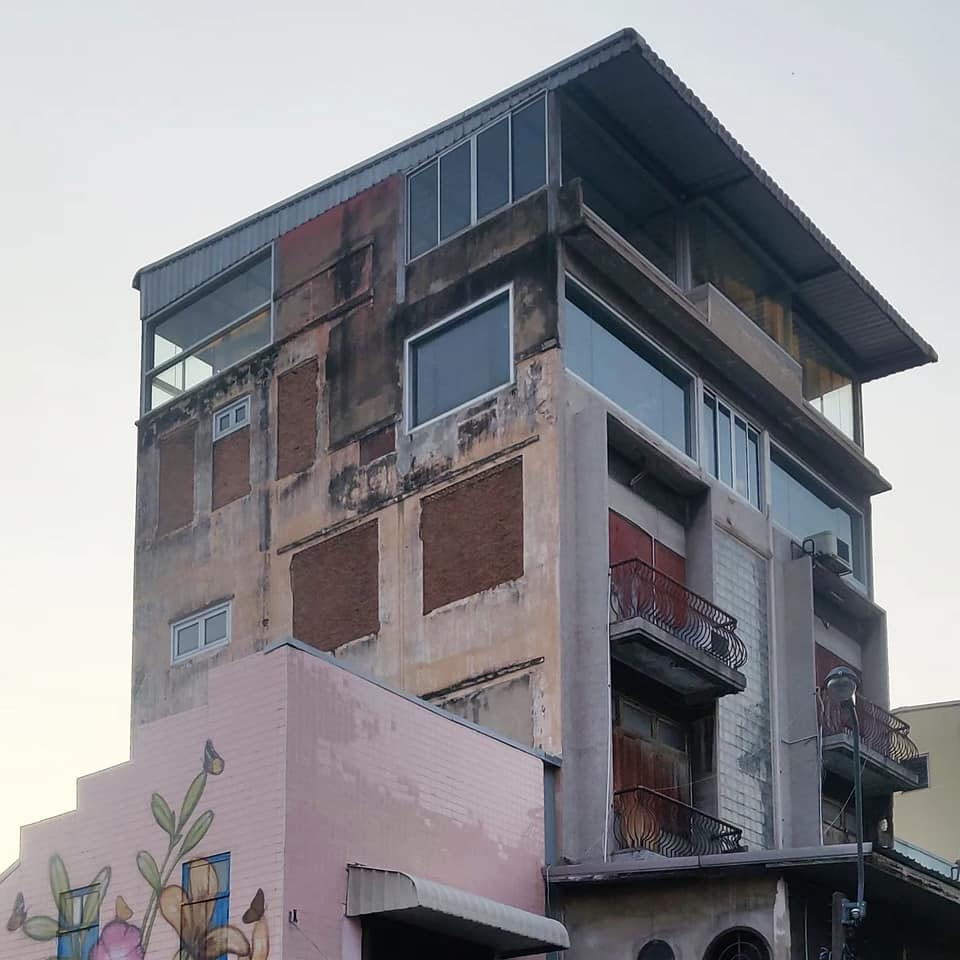
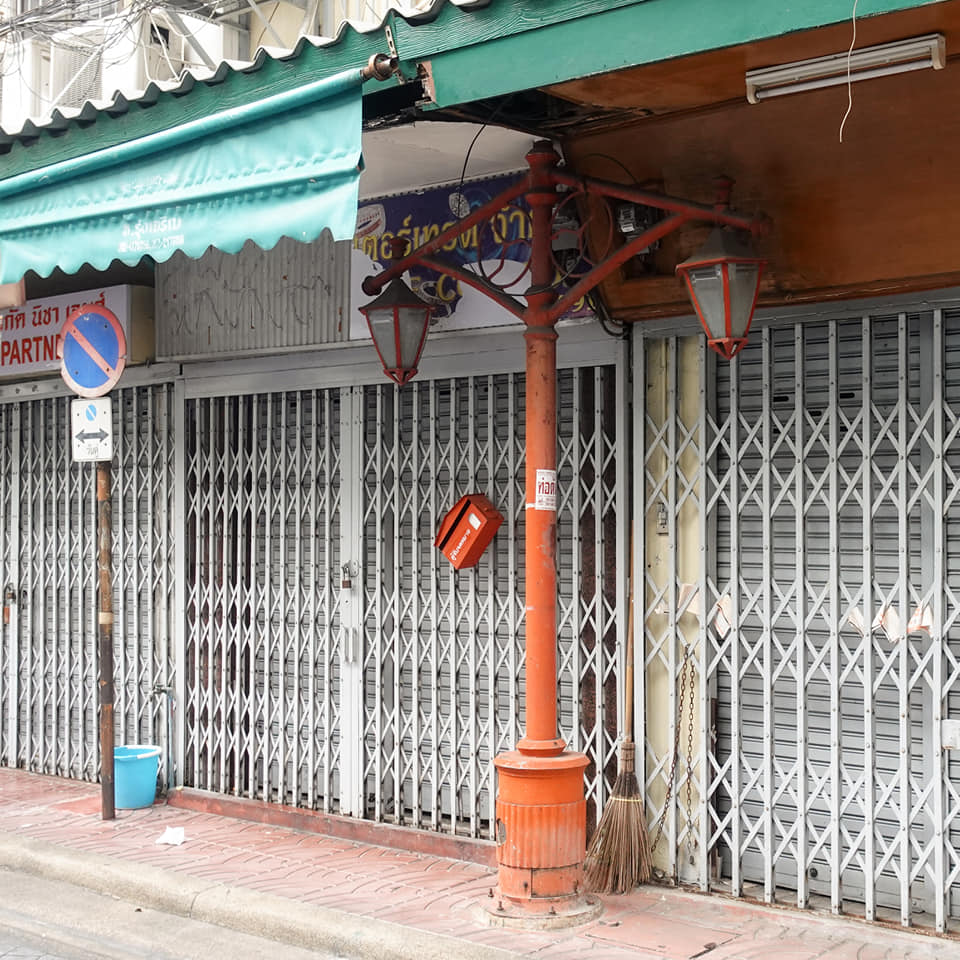
Dynamic User Input: The system combines this curated knowledge with real-time preferences captured through a brief, engaging questionnaire. The AI uses this input to generate truly bespoke itineraries.
This approach transforms the AI from a simple information tool into a creative companion for urban exploration.
The Prototype: Bangkok Fuzzy Day Trip (ทำอะไรกันดี)
The web application, "ทำอะไรกันดี" ("What should we do?"), It is the user-facing prototype for this research. The interface is intentionally simple and narrative-driven, guiding users through a conversation rather than overwhelming them with options. This design reinforces the sense of receiving a personal, thoughtful recommendation from a trusted friend.
The user experience starts with a short questionnaire. The custom AI then crafts a complete itinerary with 2–3 stops, each featuring a title, description, insider tip, and travel details. Importantly, the itinerary is not static—the user can regenerate options or adjust preferences. This interactive loop positions the AI as a responsive partner, transforming an ordinary day into a small adventure and turning urban exploration into a three-way dialogue between the user, the AI, and the city itself.
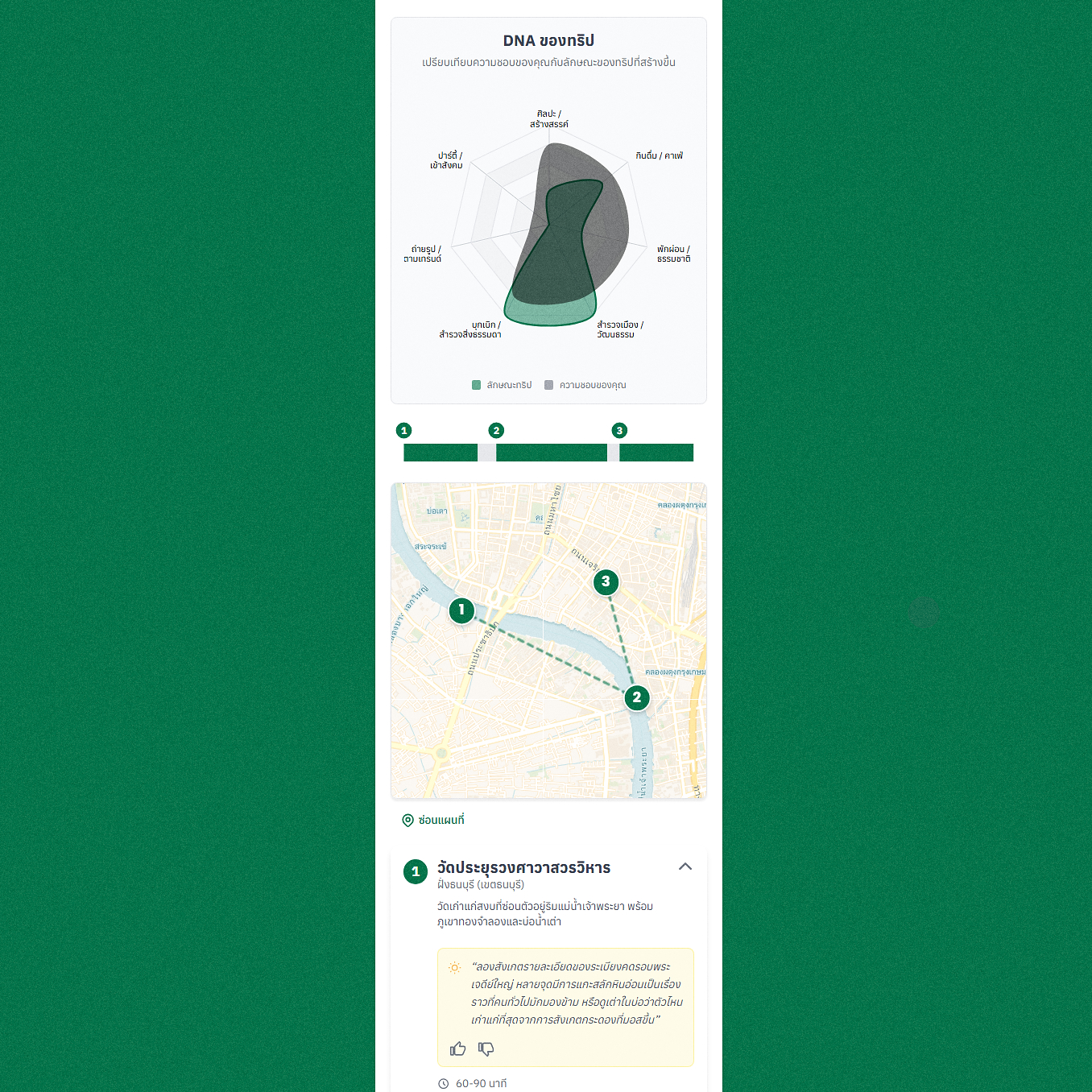
Future Directions and Research Implications:
As a research tool, Bangkok Fuzzy Day Trip opens several promising directions. Analyzing anonymized user interactions can reveal insights into urban behavior and engagement. Some guiding questions include:
- What patterns of interest emerge across different neighborhoods?
- How do playful digital tools affect people's sense of place and belonging?
- Can this AI-driven approach enhance services like community engagement or participatory planning?
By adding feedback loops, for example, allowing users to rate the quality of "insider tips," the AI can continually refine its sense of what makes an urban detail meaningful. This creates a virtuous cycle, deepening the tool’s local sensitivity. We see this project as a first step toward a new generation of civic-tech tools that combine practical use with playful curiosity, strengthening people’s relationships with the cities they inhabit.
Project Team & Acknowledgements:
This project is a collaborative effort within Bangkok City Lab.
- Project Lead: Bangkok City Lab
- Curation: Future Curiosity Lab
- Concept, Design & Development: Future Curiosity Lab
